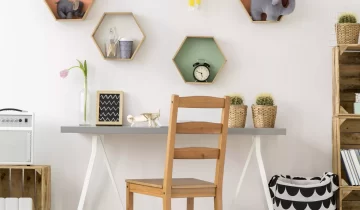In a world filled with tempting advertisements, online shopping, social media and a constant barrage of consumer culture, it’s easy to fall into the trap of mindless spending. Before you know it, your hard-earned money has disappeared on items you don’t really need.
Stopping mindless spending for your home involves adopting a combination of practical strategies and a shift in mindset. Here are some tips to help you curb impulsive purchases and make more intentional decisions about your home-related expenses:
Create a Home Budget:
– Develop a detailed budget specifically for your home-related expenses. Include categories such as mortgage or rent, utilities, maintenance, and other essential costs.
– Allocate specific amounts to each category and monitor your spending regularly to ensure you stay within budget.
– The foundation of responsible financial management is creating a budget. Start by listing your monthly income and categorize your expenses. Assign specific amounts to necessities such as rent, utilities, groceries, and savings. Having a clear overview of your financial situation helps you allocate your funds wisely and prevents unnecessary spending.
Prioritize Needs Over Wants:
– Distinguish between essential home needs and optional wants. Prioritize spending on necessities like utilities, repairs, and maintenance before considering non-essential items.
– When considering a purchase, ask yourself if it fulfills a genuine need or if it’s driven by a desire for something new or trendy. If the item doesn’t align with your essential needs or long-term goals, reconsider the purchase. Delaying gratification and focusing on what truly matters can lead to more mindful spending habits.
– Understanding the triggers that lead to mindless spending is crucial. Whether it’s stress, boredom, or the desire to keep up with the latest trends, identifying these triggers allows you to develop healthier coping mechanisms. When you feel the urge to spend, take a moment to reflect on your emotions and find alternative ways to address them, such as exercising, meditating, or spending time with loved ones.
Set Home Improvement Goals:
– Identify specific home improvement goals that align with your long-term plans. This could include saving for a renovation, investing in energy-efficient upgrades, or creating a comfortable and functional living space.
– Channel your resources toward these goals, and resist the temptation to make impulsive purchases that don’t contribute to your overarching home improvement objectives.
Embrace Minimalism
– The minimalist lifestyle promotes intentional living by decluttering both your physical space and your finances. Adopting a minimalist mindset encourages you to appreciate what you have and avoid unnecessary purchases. Before buying something new, consider whether it adds value to your life and aligns with your priorities.
Declutter and Organize:
– Regularly declutter your living space to assess what you already have. A tidy and organized home can help you appreciate your possessions and reduce the desire for unnecessary purchases.
– Consider adopting a minimalist approach, focusing on quality over quantity when it comes to furniture and decor.
DIY and Repurposing:
– Embrace do-it-yourself (DIY) projects and repurposing existing items to meet your home needs. This not only saves money but also adds a personal touch to your living space.
– Before buying new furniture or decor, explore creative ways to refresh or repurpose what you already own.
Wait Before Purchasing:
– Implement the 24-hour rule when contemplating home-related purchases. If you come across an item you want for your home, wait a day before making the decision to buy. This gives you time to evaluate whether the purchase is a genuine need or just a passing desire. Many times, you’ll find that the urge to buy fades after some reflection.
Comparison Shopping:
– Before making significant purchases for your home, research and compare prices from different retailers. Look for sales, discounts, or second-hand options to ensure you get the best value for your money.
Practice Energy Efficiency:
– Invest in energy-efficient appliances and home systems. While the upfront cost may be higher, the long-term savings on utility bills can contribute to a more mindful and cost-effective approach to managing your home.
Involve the Family:
– If you share your home with family members, involve them in the decision-making process. Discuss priorities, goals, and spending limits to ensure everyone is on the same page and committed to mindful spending.
Set Financial Goals
– Establishing clear financial goals provides motivation and direction for your spending habits. Whether it’s saving for a vacation, building an emergency fund, or paying off debt, having specific objectives helps you stay focused. Break down larger goals into smaller, achievable milestones, making it easier to track your progress and celebrate your successes along the way.
Use Cash Instead of Cards
– Credit and debit cards make spending convenient but can also contribute to mindless habits. Switching to cash for certain expenses, especially discretionary ones like entertainment and dining out, can make you more aware of your spending. Seeing the physical money leave your wallet can act as a deterrent and encourage more thoughtful purchases.

Without a budget, it becomes challenging to track expenses and identify areas where spending can be reduced. Another common misstep is the failure to build an emergency fund, leaving individuals vulnerable to unexpected expenses that can derail their savings efforts. Impulse spending also poses a significant threat to saving goals, as people often succumb to the allure of spontaneous purchases without considering their long-term impact. Often, underestimating the importance of researching and comparing prices can lead to overspending on goods and services. To achieve successful money-saving strategies, it pays to be vigilant in avoiding these pitfalls and adopt a disciplined approach to your finances and spending habits.
When trying to save money, people often make these common mistakes. Here are some of them:
1. Buying Cheap Instead of Buying Value: People often think that buying the cheapest option is the best way to save money. However, the real key to saving money is learning to buy whatever is the best value. Buying the cheapest tools that will only last a year or two, rather than paying twice as much for tools that will last a lifetime, ends up costing you more in the long run since they have to be replaced time and again
2. Stopping Spending: One major mistake that people make is that they stop spending since this seems to be the obvious way. The problem is, if done without foresight, not spending money can mean additional expenses down the road. People should stop spending on nonessentials and risk having to make a major payout later on when there are a lot of other ways to save money
3. Focusing on Saving at the Expense of Everything Else: One common mistake people make when they start saving is, surprisingly, saving too much. While it’s a good idea to put a certain amount of your income aside for retirement or to have a rainy day fund, it’s also important to enjoy life and spend money on things that make you happy. It’s all about finding a balance
4. Not Having a Budget or an Emergency Fund: Not having a budget or an emergency fund is a common mistake that can lead to overspending and financial stress. Creating a budget and setting aside money for emergencies can help you stay on track and avoid unnecessary expenses
5. Buying Items Because They Are on Sale: Buying items just because they are on sale is another common mistake. While it’s great to get a good deal, it’s important to ask yourself if you really need the item and if it fits into your budget

To avoid overspending on unnecessary items, consider the following strategies:
1. Create a Budget: Establish a written budget that outlines your monthly expenses and income. This will help you identify areas where you can cut back and allocate your funds more wisely
2. Shop with a List: Before going shopping, make a list of items you need and stick to it. This will prevent you from impulse purchases and help you focus on what you truly need
3. Set Financial Goals: Visualize what you’re saving for, such as a vacation or a new car. This will help you stay motivated to cut back on unnecessary spending and focus on your long-term goals
4. Take the No-Spend Challenge: Choose a day, a week, or a month to not spend any money on non-essential items. This will help you identify which purchases are necessary and which can be avoided
5. Shop with Purpose: Avoid shopping when you’re hungry or emotional, as this can lead to impulse purchases. Plan your shopping trips and stick to your list
6. Avoid Brand Names: Comparing labels can reveal how much extra you’re paying for name brands. Consider purchasing generic or off-brand items to save money without sacrificing quality
7. Master Meal Prep: Plan your meals ahead of time and create a grocery list to avoid impulse purchases at the store. This will also help you save money on food expenses
8. Use the Envelope System: Allocate a specific amount of money for discretionary spending and withdraw it in cash. Once you’ve spent that amount, you won’t be tempted to spend more
9. Avoid Shopping When Bored: Find alternative activities to engage in when you’re bored, such as exercising or taking up a new hobby, to avoid mindless spending
10. Track Your Spending: Regularly review your expenses to identify areas where you can cut back and avoid overspending
Overcoming mindless spending is a gradual process that involves cultivating mindfulness and adopting intentional habits. When you adopt a better home management routine, you can develop a more mindful and intentional approach to spending, and create a home environment that aligns with your values and long-term objectives. Remember, every mindful decision you make brings you one step closer to financial freedom and peace of mind.
DecorWorks showcases the latest trends and tips in home decor and interior design to inspire your best life. We curate architecture and design inspiration for global audiences, and show you practical tips to create any imaginable space.






 No products in the cart.
No products in the cart.